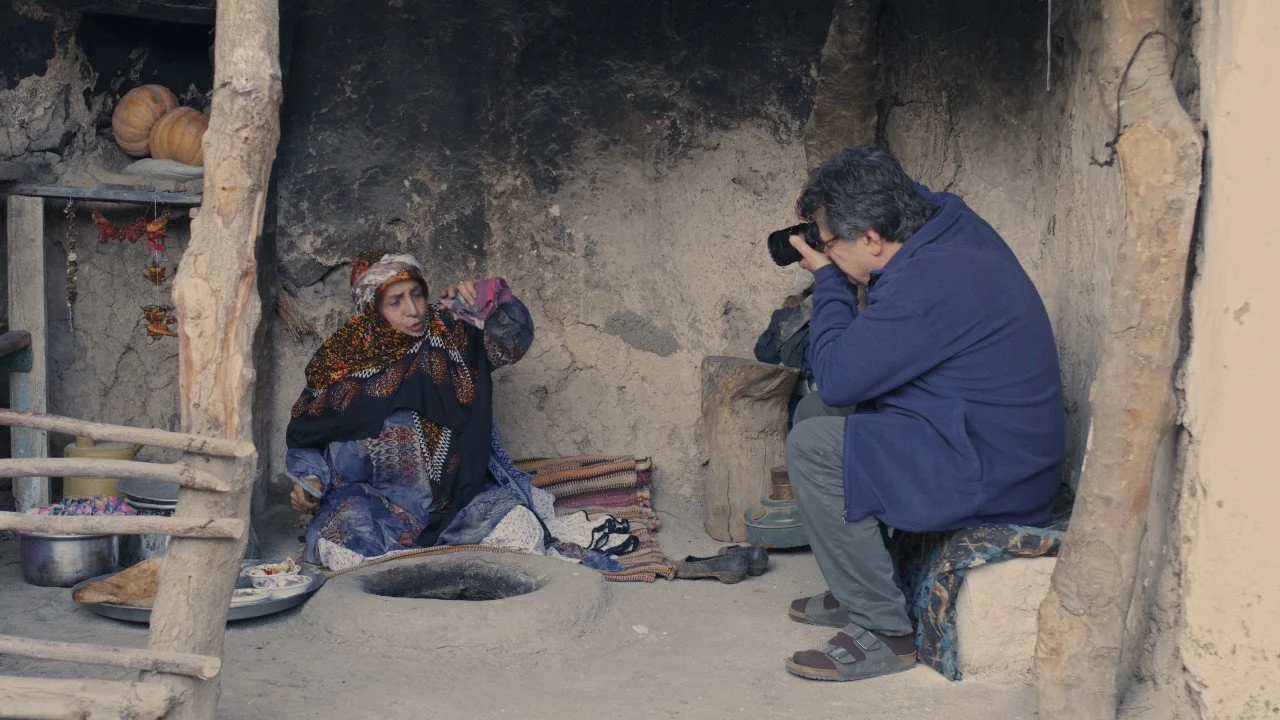No Bears: Jafar Panahi’s Tragic Iranian Meta-Fiction
By Liam Lacey
Rating: A
Nowhere in the world is making films a more a consequential political act than in Iran.
Last Saturday, Taraneh Alidoosti, star of Asghar Farhadi’s Oscar-winning movie The Salesman, was arrested for a social media post. Two other actresses, Hengameh Ghaziani and Katayoun Riahi, were arrested (and subsequently released) in November for expressing solidarity with protesters.
While other prominent filmmakers have left the country over the past two decades, no director has demonstrated the wish to stay and support change more than 62-year-old Jafar Panahi. His latest, No Bears, will be released on Friday, while its creator languishes in prison where he has been since July of this year.
Panahi has been one of Iran’s most celebrated filmmakers since his 1995 debut, The White Balloon, followed by The Mirror, The Circle, Crimson Gold, and Offside, all of which won major international film festival awards. In his films and interviews with international journalists, Panahi has always been forthright about his criticisms of the regime.
Because of his support of the pro-democracy green revolution (2009-2010), Panahi was arrested, imprisoned, and banned from making films for 20 years. In the dozen years since, his situation was upgraded from imprisonment to house arrest to restrictions on travel.
During this period, in defiance of the ban, Panahi’s career entered its dissident phase with a series of quasi-autobiographical films (This Is Not A Movie, Curtains, Taxi, 3 Faces), that are exemplary in their combination of personal courage and creative invention.
In No Bears, Panahi plays a filmmaker who has rented a primitive concrete-block room in an Iranian village near the Turkish border. Despite erratic Wi-Fi and the increasingly paranoid villagers, he is trying, via a cell phone and laptop, to remotely direct a movie in Istanbul.
The film is about a couple of middle-aged Iranian expats — café waitress Zara (Mina Kavani) and her husband Bakhtiyar (Bakhtiyar Panjeei) — who have crossed over to Turkey and are trying to acquire stolen passports to escape to Europe. The actors are a real-life couple who are also attempting to get out of the country.
There’s a practical reason why Panahi has chosen to set up his base near the border, rather than in Tehran. His assistant director, Reza (Reza Heydari) cross the border legally to bring him rushes on a hard drive and consult with him. At a nighttime meet-up, Reza tempts Panahi to take the step across the invisible border to join the Turkish crew, but the director jumps back fearfully.
Zara and Bakhtiyar’s predicament has a parallel love story in the local village, a riff on the tragedy of Romeo and Juliet. A young woman, Gonzal (Darya Alei) has been betrothed since birth to angry misfit Yaghoob (Javad Siyahi) but she loves Soldooz (Amir Davari), a young man who was expelled from university for joining a political protest. The villagers, led by the local sheriff (Naser Hashemi) believe the arranged marriage will heal a rift between two families.
There is a rumour that Panahi, while shooting a local wedding ceremony, has accidentally captured a compromising image of Gonzal with Soldooz under a walnut tree.
The villagers demand to see the photos on his camera, but Panahi resists. The villagers, though initially courteous and deferential in dealing with the stranger in their midst, become increasingly threatening. They demand he takes an oath that he has no such image on his memory card, though the local sheriff confides that it’s fine if Panahi lies. The important thing is to keep the peace by bowing to authority.
All this takes place against a background where drought has ruined the local farming economy. The villagers depend on smuggling both humans and goods across the border area, which is controlled by criminal gangs, who will kill anyone who attempts to get through without paying.
The presence of the politically ostracized director near the border, in his new car, attracts interest from the Republican Guard that no one wants. “You guys are looking for an excuse to make me leave the village,” says Panahi, in an obvious echo of his confrontations with the Iranian regime.
Meanwhile, the director’s responsibility in recording reality and creating fiction comes under scrutiny. The film in Turkey is falling apart, as the actors are angry that Panahi is playing games with their own desperate real-life story. Panahi’s presence in the village has unleashed forces that turn increasingly dangerous.
At times, No Bears can come across as frustratingly convoluted, but Panahi is an artful filmmaker, who surprises us by breaking the rhythms of the film with disruptions, confrontations, and plot twists. There are also tender, quiet sequences, as Panahi bonds with his landlord’s mother (Narjes Delaram) who cooks him hot meals in a clay oven, and he provides her with medication for her sore feet.
Perhaps surprisingly, given what Panahi has been through, there are no obvious villains here, just fearful people capitulating to authority and superstition. The fearful “bears” that supposedly roam the border territory are a fiction, designed to keep people afraid and in their place. To paraphrase Shakespeare in another context, the fault is not in our bears but in ourselves.
No Bears. Directed and written by Jafar Panahi. Starring Jafar Panahi, Naser Hashemi, Vahid Mobaseri, Bakhtiar Panjei, Mina Kavani, Narjes Delaram, Reza Heydari, Amir Davari and Darya Alei. Opens December 23 in select thteares including TIFF Bell Lightbox (Toronto), Cinema du Parc + Cinema du Musée (Montreal), Bytowne Cinema (Ottawa), Sudbury Indie Cinema, Broadway Theatre (Saskatoon), Metro Cinema (Edmonton) and Vancity Theatre (Vancouver).



